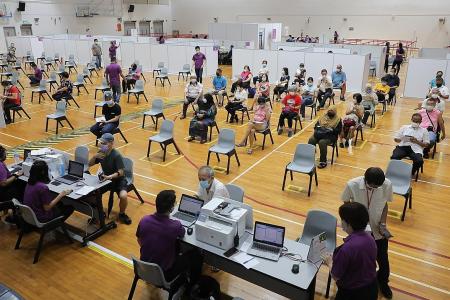Singapore sets longer intervals between Covid vaccine shots
Health Minister Ong Ye Kung says move could see 4.7m individuals with at least one dose by August
Singapore's Covid-19 vaccination strategy will change from today, with the interval between the first and second doses extended to six to eight weeks, from three or four weeks previously.
Health Minister Ong Ye Kung said yesterday the new approach was adopted in consultation with the expert committee on Covid-19 vaccination and will allow 400,000 more people to be vaccinated by July.
Speaking at a press conference by the multi-ministry task force handling the pandemic here, Mr Ong added: "If all goes smoothly, 4.7 million individuals will be covered by at least one dose of vaccination by August (and) this will substantively cover almost all our eligible population."
As of Monday, nearly two million people have received at least one dose, with over 1.4 million having completed the full vaccine regimen.
The idea is to protect more residents faster, but while a number of countries have adopted a similar strategy, there are some scientists who believe partial immunity could lead to further virus mutations.
But Dr Leong Hoe Nam, an infectious diseases specialist from the Rophi Clinic, told The New Paper yesterday: "Whatever you throw at the virus, be it masks or partial immunity, it gives the virus incentive to mutate against it. However, mutants come about only with replication.
"If we combine vaccination with other measures like wearing masks and safe distancing, the virus will not be able to replicate. In a restricted transmission situation in Singapore, getting more people vaccinated now with a single dose is a more effective way of delivering herd immunity."
Singapore's Covid-19 vaccination programme will be rolled out to those aged between 40 and 44 from today, said Mr Ong, and from today, those who register for vaccination will have their second dose scheduled six to eight weeks after the first.
The task force also announced yesterday that the Pfizer-BioNTech vaccine has been approved for use for the 12 to 15 age group, and an update will be provided soon.
Said Mr Ong: "I explained in the earlier phase of vaccination that so far, we have been focusing on people who need it the most - vulnerable groups as well as those on our front lines.
"We give them two doses so as to give them maximum protection. Now that we move on to younger groups, there is merit in thinking about how to do it differently, giving priority to the first dose, so that we cover as many of our population or as big a proportion of our population as possible."
The expert committee said in a press release yesterday it considered emerging scientific evidence, and that the strategy is reasonable "where there is a compelling need".
Made up of experts in the field of infectious diseases and immunology, among others, the committee's statement added: "An extension to six weeks, but not longer than eight weeks, would not materially impact the eventual overall immune response, as long as the second dose is eventually administered."
Some parents TNP spoke to yesterday welcomed the news that their children could now be vaccinated.
Finance clerk Suganthi Kalimuthu, 49, a mother of three girls aged 12, 14 and 16, said: "I read in the papers that even a vaccinated person can get the virus but that it won't be so serious... I prefer my children to get that extra protection if available.
"It'd be great if students can get at least one dose of the vaccine before the start of the next school term."
Mrs Susie Chua, who has a 12-year-old daughter and 17-year-old son, also applauded the move.
"It is a good decision as children interact in close proximity in school, and it is difficult to tell them to watch their social distance," said the 50-year-old, who works in sales operations.
However, she would adopt a wait-and-see approach, looking to find out how children in countries that have approved the vaccine for teenagers react.
"As parents, we just want assurance that the vaccine is safe," she said.
FOR MORE, SEE PAGES 2 AND 3 AND READ THE STRAITS TIMES
Get The New Paper on your phone with the free TNP app. Download from the Apple App Store or Google Play Store now


